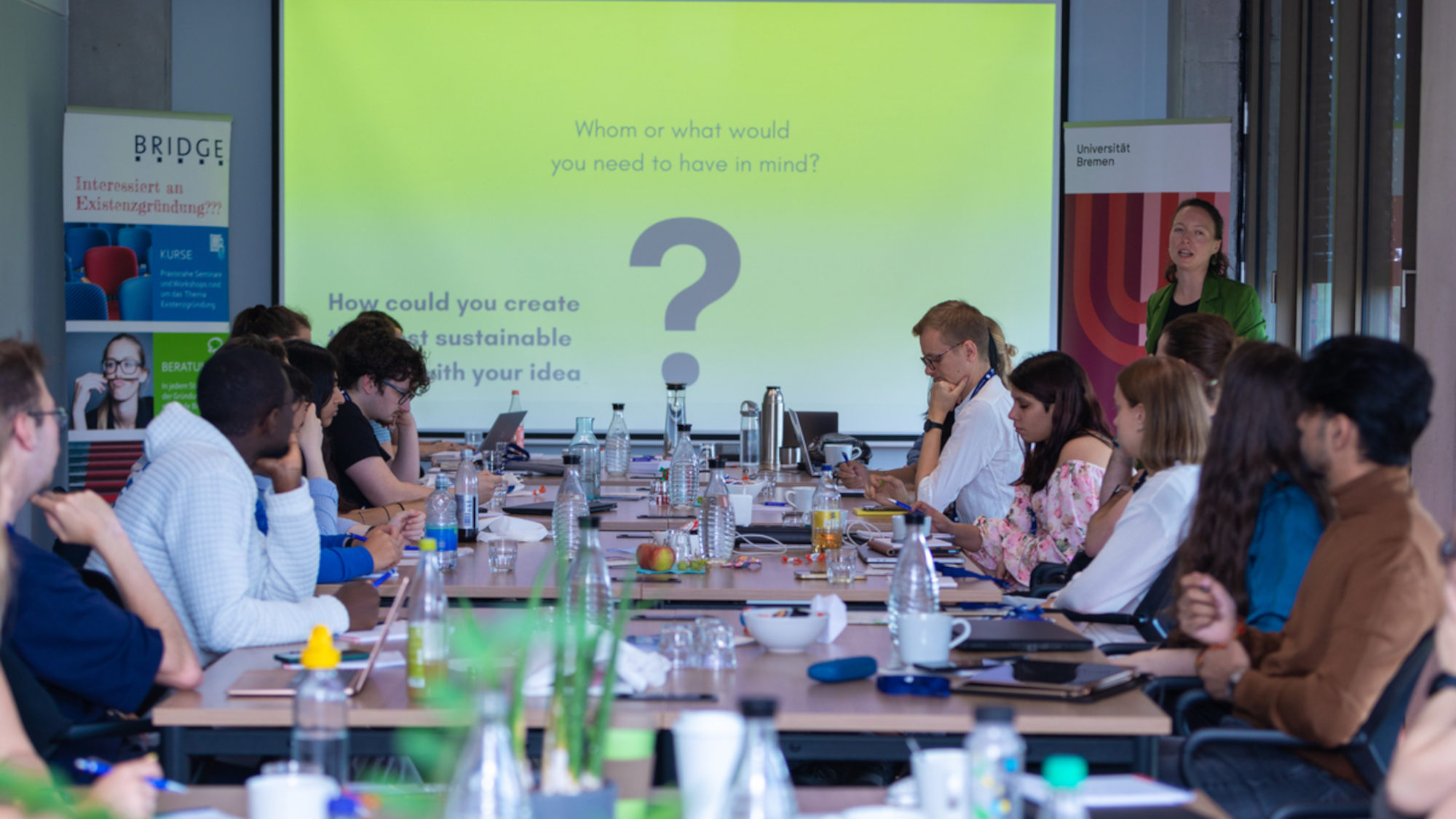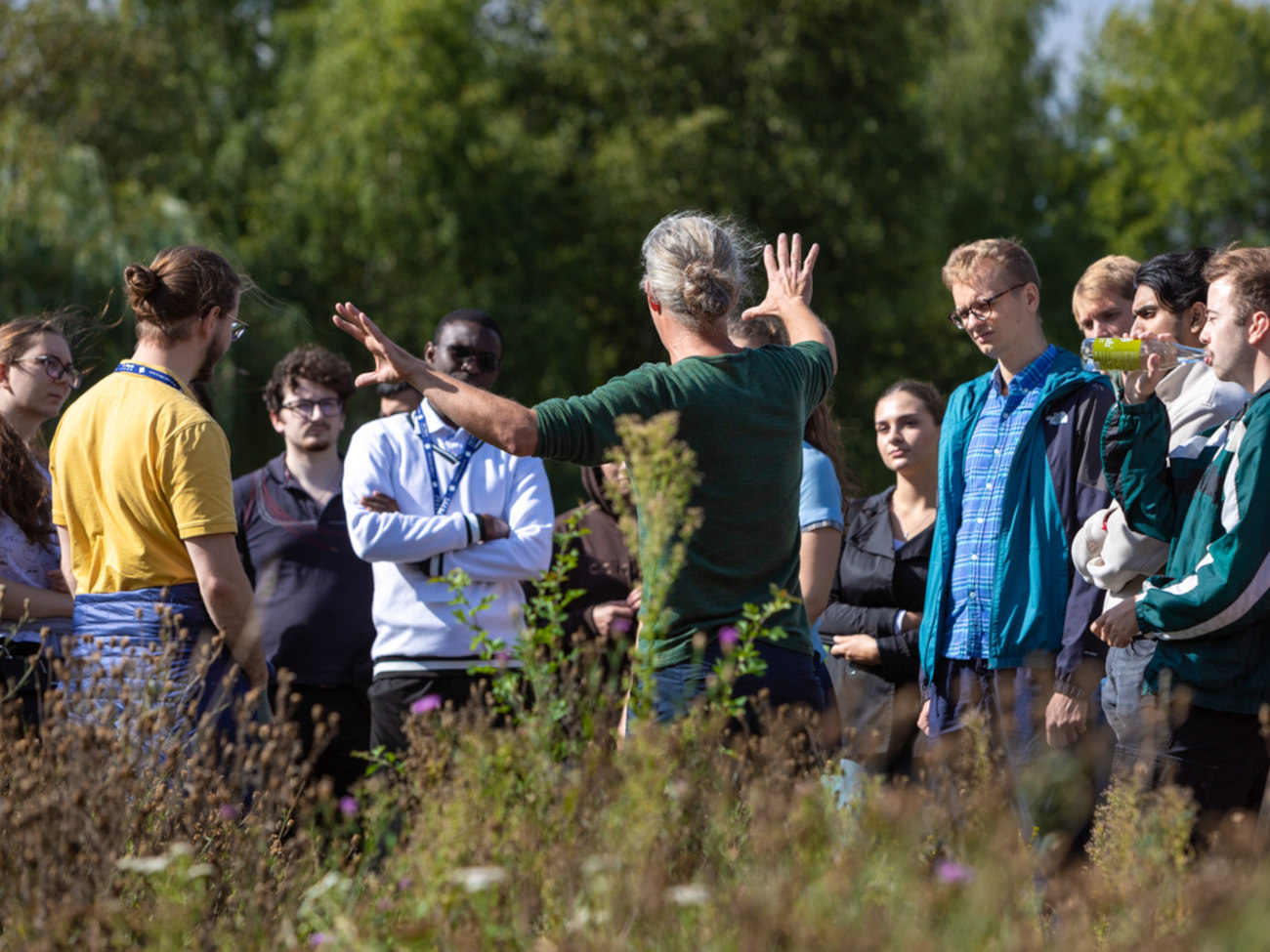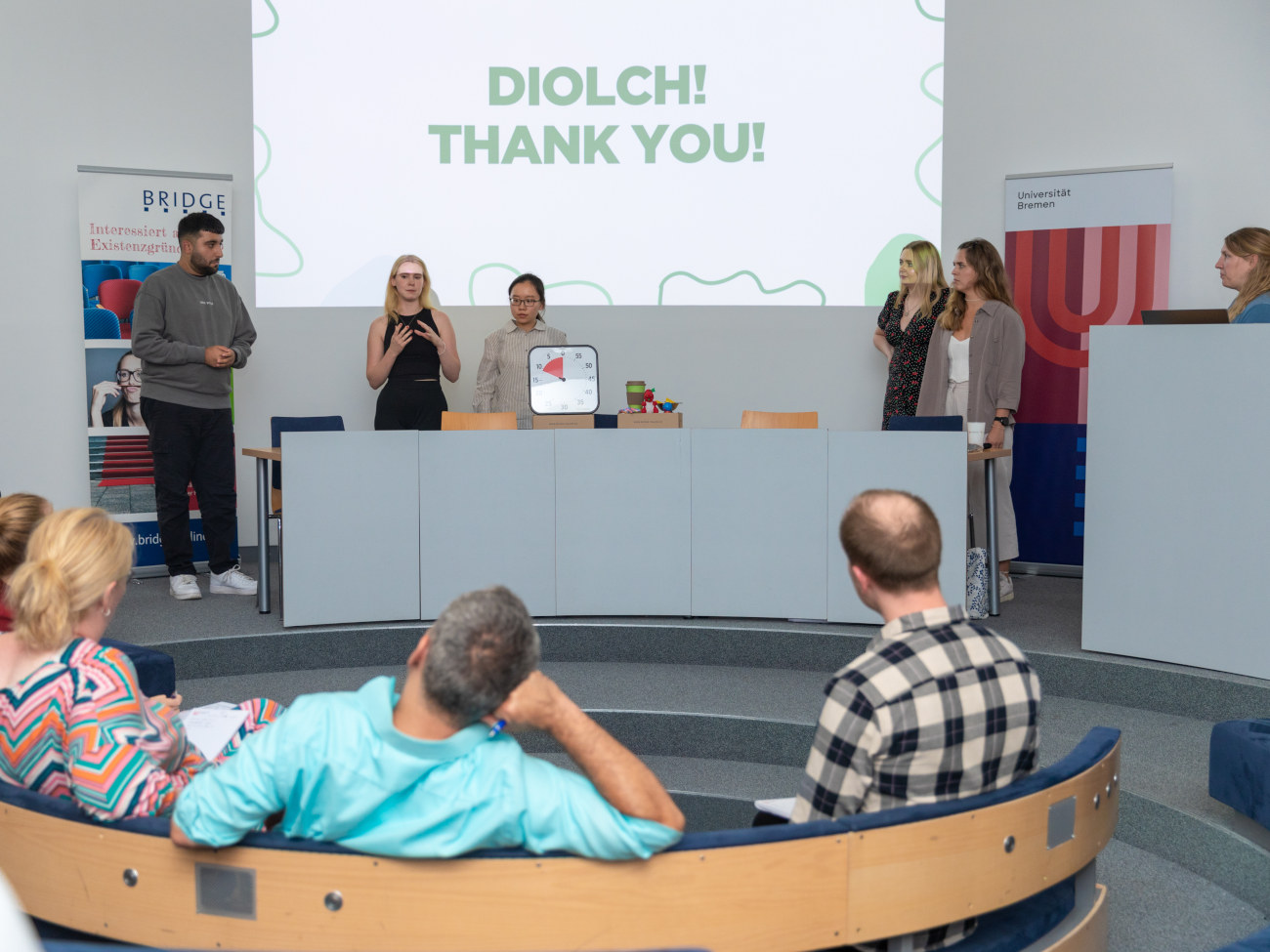
© Matej Meza / Universität Bremen
Two Countries, Seven Days, 26 Students, Countless Ideas
The Bremen-Cardiff Initiative on Sustainability and Entrepreneurship brings together students from Germany and Wales.
Strengthening intercultural skills, developing start-up ideas, and gaining insights into the start-up communities in Germany and the UK – students can do all of this in the Bremen-Cardiff Initiative on Sustainability and Entrepreneurship. Interested students from all faculties can now apply for the next event in September 2024.
After Brexit, cooperation between German and British universities has become more complicated. The Bremen-Cardiff Alliance wants to counteract this. Founded in 2019, the alliance facilitates closer links between researchers from the universities of Cardiff and Bremen and provides mobility grants for joint research and teaching activities. One of the alliance’s projects is the Bremen-Cardiff Initiative on Sustainability and Entrepreneurship. “We invite students from Cardiff and Bremen to develop sustainable business ideas,” says Meike Goos, managing director of the BRIDGE university network and start-up consultant at the University of Bremen’s UniTransfer unit. She is organizing the event together with colleagues from UniTransfer / BRIDGE and the International Office at the University of Bremen as well as the Global Opportunities and Entrepreneurship team at Cardiff University. “Over the course of seven days, the students receive information on entrepreneurship and sustainability, develop their business ideas in teams, and present them to a jury at the end,” Meike Goos explains the concept. The meeting held in September 2023 was the third she had organized. Unlike the first two events, this time it was possible to meet in person: Initially, the 26 participants networked online for four days. After that, the students from Cardiff came to Bremen for three days.
From Brainstorming to Presentation – Inspiration from Universities and Start-ups

© Matej Meza / Universität Bremen
“We are working with staff from both universities as well as start-up and coaching professionals to give students a comprehensive and authentic insight,” says Georgina Moorcroft, Senior Manager of Student Enterprise and Start-up at Cardiff University. How do you actually develop a business idea? How do you find out whether there is a market for your idea? And how can you successfully pitch your concept? These are just some of the many issues addressed by the students. Last year, the focus was primarily on net zero emissions and biodiversity. Marko Rohlfs, Professor of Chemical Ecology at the University of Bremen, for example, presented the “Bremen Goes Sustainable” project, which he coordinates, in a video conference on the first day of the meeting. Afterwards, Dr. Doris Sövegjarto-Wigbers, managing director of the Sustainability Forum and environmental management coordinator at the University of Bremen, explained the university’s sustainability efforts, for example, its electricity procurement and sustainable mobility management. In addition, staff from the International Office explained to the Cardiff students what opportunities there are to study at the University of Bremen.
Learning from the British Start-up Mindset
Leo Hansen, who is studying business administration in his third semester, attended the meeting for the first time last year. He found it particularly enriching to interact with the British students. “The start-up mindset there is very different to here,” he says. In Germany, people are often questioned if they want to found a start-up during or directly after graduation. Not so in the UK: “I’ve met several students from Cardiff who have already launched a start-up or plan to do so in the near future,” says Leo Hansen.

© Matej Meza / Universität Bremen
Working in small teams of four to six students, they develop plans for a specific business idea. “We try to form teams that are as diverse as possible, with students from both countries and from different disciplines,” explains Georgina Moorcroft. After all, the interdisciplinary nature is very important to the organizing team. Last year, for example, in addition to students from economics, there were also participants from social sciences and engineering subjects. “The main impetus for our business idea came from a participant from a marine science program,” reports Leo Hansen. The group developed a concept for an online platform to provide information about the effects of climate change to the ocean. Other teams worked on ideas such as a consultancy firm for sustainable horticulture – or a program that educates children about the effects of climate change and suggests hands-on ways for them to protect the environment. At the end, the students pitch their ideas to a jury of experts in the fields of entrepreneurship and sustainability.
Registration for the Next Round Opens in April
The next round of the program will take place in September 2024 – this time involving a meeting in Cardiff. Registration is now open at www.uni-bremen.de/kooperationen/hochschulkooperationen/hochschulkooperationen-weltweit/strategische-partnerschaften/bremen-cardiff-alliance. A unique opportunity, says Leo Hansen. “You can look beyond your own discipline, gain intercultural experience, and even earn credit points at the same time,” he says. And make friends: He is still in contact with several of the students he met in Cardiff.
Business Start-ups at the University of Bremen / Bridge
BRIDGE, which is part of the UniTransfer unit, is the central point of contact for students, alumni, and members of Bremen’s universities when it comes to business start-ups. The BRIDGE university network is supported by the University of Bremen, Bremen University of Applied Sciences, Bremerhaven University of Applied Sciences, the University of the Arts Bremen, Constructor University, and Bremer Aufbau-Bank GmbH. BRIDGE has the aim of improving the entrepreneurial climate at all involved universities and supporting promising ideas with start-up potential at an early stage.
BRIDGE advises around 160 start-up projects per year and offers more than 80 events involving over 2,200 participants on the topic of business start-ups. The BRIDGE network is able to record 20 start-ups per year from Bremen’s universities. Furthermore, the network has acquired over 11 million euros in funds from the nationwide EXIST program since 2007. The CAMPUSiDEEN competition, with prizes worth over 20,000 euros, rounds off each year. Since 2003, around 800 entries have been submitted. This makes CAMPUSiDEEN one of the most continuous competitions of its kind.
About UniTransfer
The University of Bremen is aware of its responsibility in the community and, due to its broad understanding of research-based knowledge and technology transfer, seeks to involve society as a whole. UniTransfer is the University of Bremen’s central point of contact between academia, business, and society. The experts at the knowledge and technology transfer office support collaborations and projects across the entire spectrum of university subjects. This ranges from assisting with business start-ups, commercial use of inventions, referrals of specialists and managers, and providing science communication services to coordinating school projects, managing the University of Bremen Foundation, as well as coordinating university fundraising.